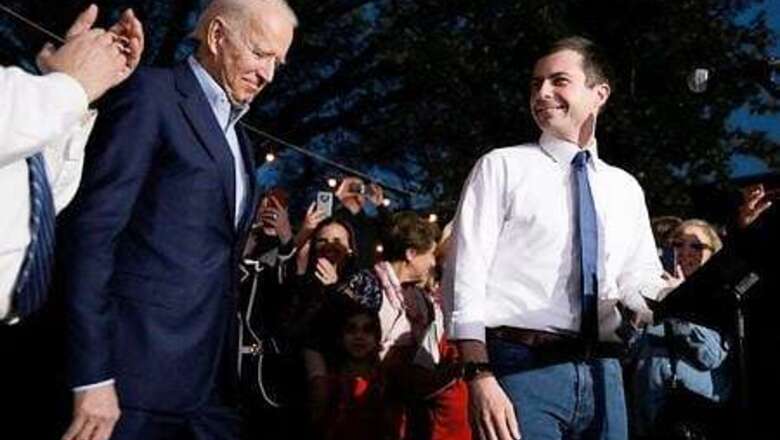
views
NEW YORK (Thomson Reuters Foundation) – As the U.S. Democratic National Convention drew to a close, Pete Buttigieg, the party’s first openly gay presidential candidate, took to the virtual stage to note the historic significance of his campaign.
“The day I was born, close to where I’m standing here in South Bend, the idea of an ‘out’ candidate seeking any federal office at all was laughable,” said Buttigieg, who came out in 2015 after being elected mayor of South Bend, Indiana, in 2012.
“Yet earlier this year I campaigned for the presidency, often with my husband at my side, winning delegates to this very convention.”
Buttigieg’s high-profile candidacy, along with a record number of lesbian, gay, bisexual and transgender (LGBT+) people running for office this year, has cemented 2020 as one of the most progressive election cycles in U.S. history.
This year, more than 880 openly LGBT+ candidates have appeared or will appear on ballots across the country, nearly double that of 2018, according to the LGBTQ Victory Institute, which supports LGBT+ candidates.
The U.S. political landscape has shifted rapidly, with 843 openly LGBT+ elected officials at all levels of government nationwide – double that of 2016, it said.
Still, LGBT+ people hold only 0.17% of elected positions nationwide, the Institute found, while making up 4.5% of the population.
Attitudes have changed since Kathy Kozachenko became the first openly gay person to win an election in 1974, securing a city council seat in Ann Arbor, Michigan.
“This city is being taken over by hippies and faggots,” fellow councilman Clyde Colburn told local media in the Midwestern city at the time.
With the advent of AIDS in the 1980s, which decimated a generation of gay and bisexual men, a wave of homophobia scapegoated potential LGBT+ leaders.
It was not until 1999 that Wisconsin Democratic Senator Tammy Baldwin became the first openly gay politician to be elected to Congress.
Before her, politicians, including Massachusetts Congressman Barney Frank and Arizona Congressman Jim Kolbe, only came out after being elected.
CHANGING ATTITUDES
President Donald Trump’s 2016 victory as a political outsider has encouraged more LGBT+ candidates to stand this year, said Don Haider-Markel, a political science professor at the University of Kansas.
Before Trump, under-represented groups like women, African-Americans and LGBT+ people feared they could not get elected because they were not visible in mainstream politics, he said.
“A lot of those perceived barriers weren’t really that real in the first place, but they’ve kind of been removed in the sense of, ‘well, if he can do it, I can do it’,” he said.
The surge in candidates can also be explained by Americans’ shifting attitudes on LGBT+ rights and in response to the conservatism of the Trump administration, Haider-Markel said.
“I see it in large part as a reaction to the Trump era and the politics of Trump,” he said.
Support for same-sex marriage, largely seen as synonymous with support for LGBT+ rights, has risen to 62% of Americans, according to the Public Religion Research Institute, compared with 36% in 2007.
“When I was growing up, there was no openly gay member of Congress and there was no one in public life from whom I could draw comfort and inspiration to be my authentic self,” said Mondaire Jones, an openly gay Democratic candidate.
If elected to the U.S. House of Representatives, Jones, who is from a New York City suburb, would be one of the first openly gay Black members of Congress, along with another New Yorker, Ritchie Torres. Both are favoured to win.
“It was never why I was running for office,” Jones told the Thomson Reuters Foundation, describing 2020 as a “renaissance” for LGBT+ candidates.
“But I know the power of representation,” he said, adding that he has received letters of thanks from LGBT+ youth all over the country during his campaign.
GENUINE LEADERS
Democrat Katie Dixon launched her campaign for the Kansas House of Representatives in January and in June, as she worked on LGBT+ issues for Pride month, came out as bisexual.
“I was like, ‘I can’t not say something’,” said Dixon, whose parents and son did not know her sexuality at the time.
“It almost felt disingenuous to say, ‘Oh I’m an ally, I’m an ally in this fight’.”
Dixon went on to win her party’s primary race.
“I’ve always considered this a liability and it’s just not,” she said. “You have to be genuine and people respond to that because they want genuine leaders.”
Buttigieg bowed out of the presidential race in March after he came second in the New Hampshire primary, and endorsed former Vice President Joe Biden’s candidacy.
Despite his loss, he made a lasting change on U.S. politics, other candidates say.
“Mayor Pete broke a barrier at the highest level of politics,” said Torres, who is seeking to represent New York City’s South Bronx in Congress as a Democrat.
“Once there is a viable, openly LGBTQ candidate in a fiercely contested presidential primary, there’s no longer a ceiling for as far we can go as a community.”
Disclaimer: This post has been auto-published from an agency feed without any modifications to the text and has not been reviewed by an editor




















Comments
0 comment